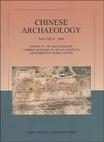中国考古学
出版时间:2008-12 出版社:中国社会科学出版社 作者:刘庆桂 主编,《考古》杂志社 编 页数:210
内容概要
《中国考古学(第8卷·2008)(Chinese Archaeology)》主要讲述了The Origins and Development of Animal Domestication in China、Yuan Jing、The Shang Building Remains at Xiaomintun in Anyang City、Yinxu Xiaomintun Archaeological Team、The Shang Bronze Foundry-Site at Xiaomintun in Anyang City、Yinxu Xiaomintun Archaeological Team、Recent Archaeological Discoveries on the Yinxu Xiaomintun Site in Anyang and Related、Problems、Wang Xuerong & He Yuling等内容。
书籍目录
Feature The Origins and Development of Animal Domestication in China Yuan Jing The Shang Building Remains at Xiaomintun in Anyang City Yinxu Xiaomintun Archaeological Team The Shang Bronze Foundry-Site at Xiaomintun in Anyang City Yinxu Xiaomintun Archaeological Team Recent Archaeological Discoveries on the Yinxu Xiaomintun Site in Anyang and Related Problems Wang Xuerong & He YulingReport The Upper Paleolithic Longwangcan Site at Yichuan in Shaanxi The Institute of Archaeology, Chinese Academy of Social Sciences Shaanxi Provincial Institute of Archaeology The Shangshan Site, Pujiang County, Zhejiang Zhejiang Provincial Institute of Cultural Relics and Archaeology Pujiang Museum The Tianluoshan Neolithic Site at Yuyao, Zhejiang Zhejiang Provincial Institute of Cultural Relics and Archaeology Yuyao Municipal Council of Cultural Relics Conservation Hemudu Site Museum The Neolithic Site at Shuangdun, Bengbu Anhui Provincial Institute of Cultural Relics and Archaeology Anhui Bengbu Municipal Museum The Xiantouling Neolithic Site at Shenzhen City, Guangdong The Shenzhen Municipal Apprisal Institute of Cultural Relics and Archaeology Shenzhen Municipal Museum The Large-sized Building-Foundations IIFJT1 on the Walled-town Site of the Mid Taosi……
章节摘录
插图:In spatial distribution, the house-foundations in the northern area are unclear as to their number and distribution owing to the limitation of their condition, the rest are relatively concentrated in three spots of the middle and south of the southern area. The clearly open ground between these groups of houses indicates that they were relatively independent and must have formed three settlements featuring both independency from and close relation with each other. In layout, the houses of every group are arranged in rows on the whole, in picturesque order and roughly in the northwest to southeast direction. The housegroups are roughly the same in grouping form, house structure and living furniture, such as the making way of door-ways and "earthen beds." The heaps of remains formed by collapse in subterraneans suggest that the walls were built of rammed-earth, straw-mixed clay and adobe.Among the three groups of houses in the southern area, the southern two were seriously damaged for the sake of bronze foundry. The northern one is relatively good in condition, the layout remains rather clear, and the subterraneans total 70 rooms in 27 complexes. Its building features can be summed up as follows.1) Concentration in distribution and rowing in good order. The rows stretch from south to north. Of them eight are better preserved. They are arranged at an interval of 8-10 m between each other. Certain dislocation was made for the convenience of ventilation.2) Well-designed structure and rational layout. Every hou, se complex constitutes a relatively independentunit. They are varied in structure, falling into the single-double- triple- and tetrad-roomed types (quintuple-roomed occurred in other groups of houses). Their combination is also multiform, in the “口”,“吕”,“品” or“十”-shaped pattern, with the doorway generally in the south or east of the building. The single-roomed houses are square or rectangular, and the multi-roomed are linked by passages. In design, great attention was put on the hall or entrance hall, which combined the rooms into an organic whole. To borrow modern architectural terms, these building complexes can be called single-room and single-, double- and triple-room single-hall houses respectively.
编辑推荐
《中国考古学(第8卷·2008)(Chinese Archaeology)》是由中国社会科学出版社出版的。
图书封面
评论、评分、阅读与下载
